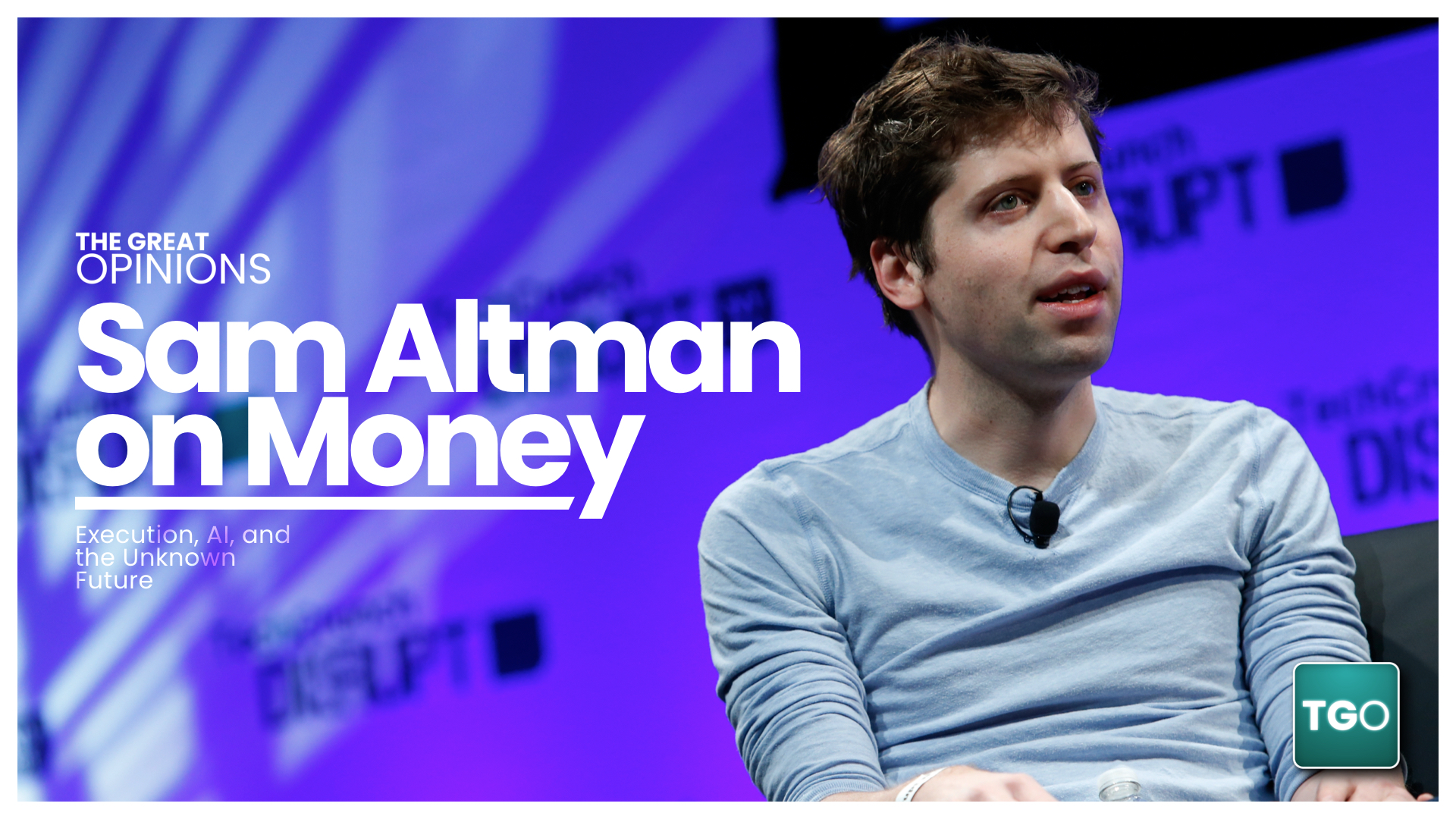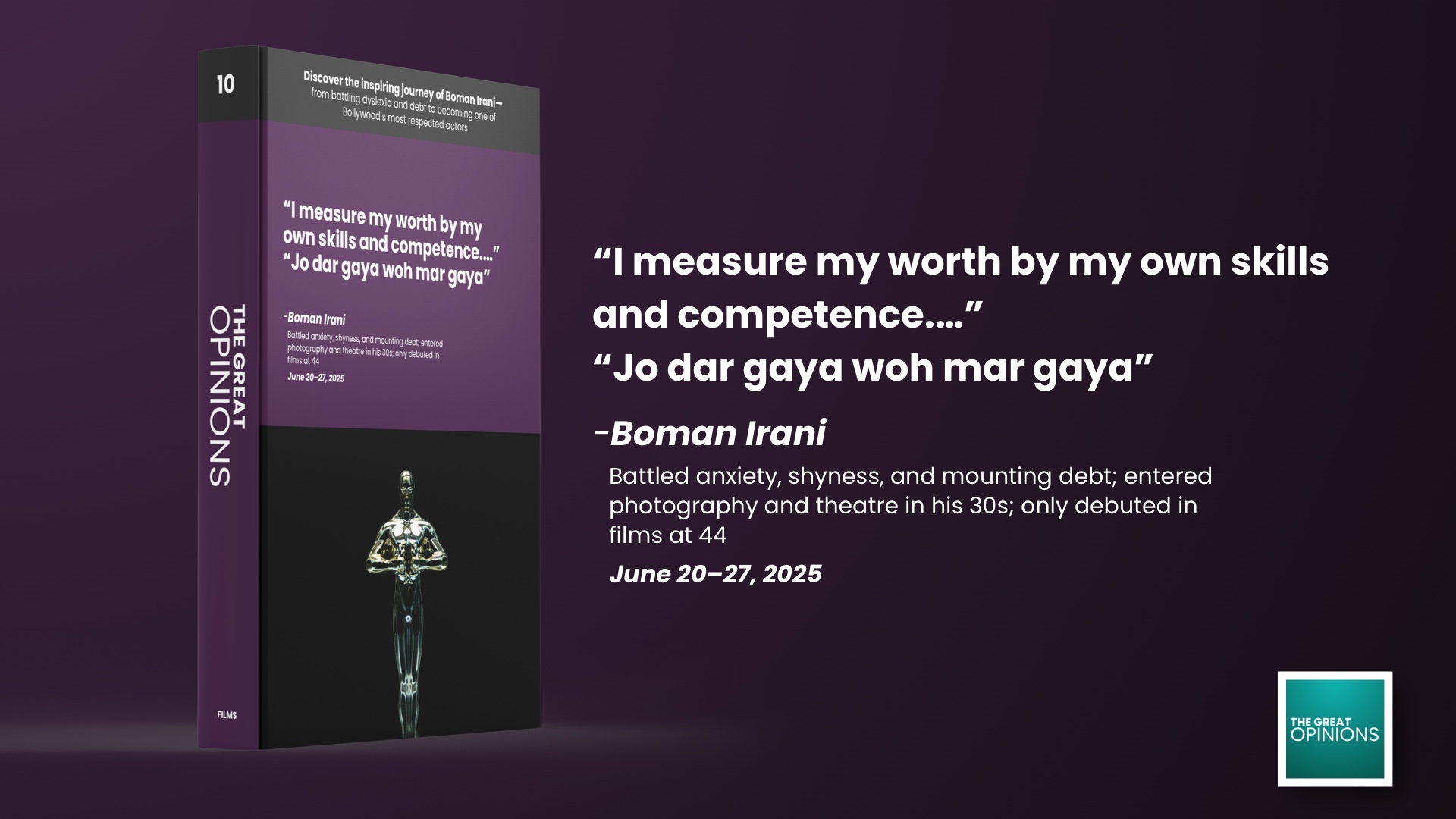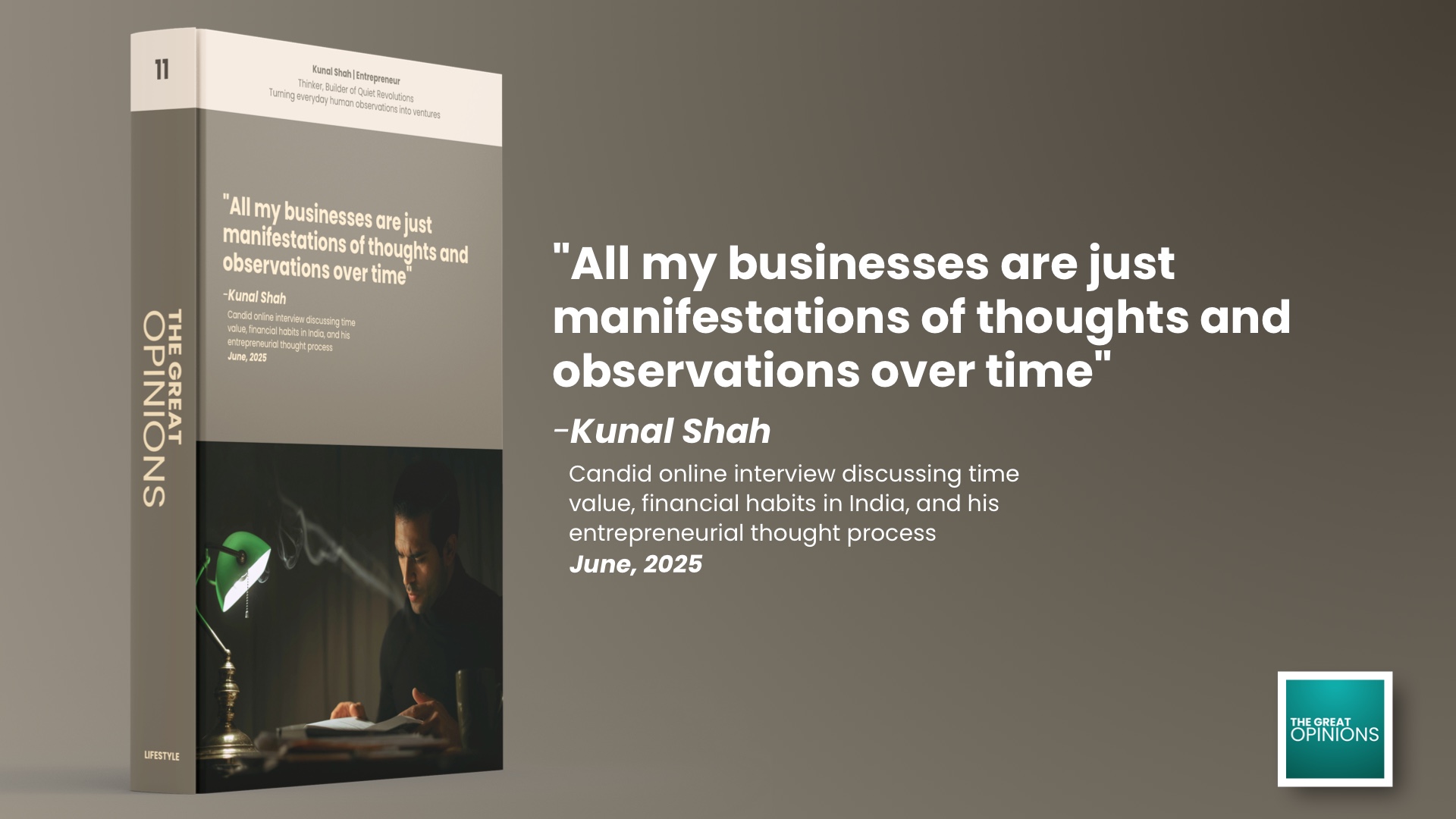— Nikhil Kamath, Co-founder of Zerodha, at his recent talk citing the WEF’s Future of Jobs Report 2025
| Topic | Details |
| Who is Nikhil Kamath? | Co-founder of Zerodha and True Beacon, India’s youngest billionaire, a self-taught entrepreneur known for redefining traditional ideas of education. |
| Education | School dropout with no formal college degree. Built a fintech empire through self-learning, trading, and investing acumen. |
| Famous Quote | “The days of four-year college courses are over. Lifelong learning is the new norm—for everyone.” |
| Where It Was Said | In an interview with The Economic Times as part of the Panache leadership series. |
| Date of Exchange | June 22, 2025 |
| Occasion/Setting | Exclusive feature focused on future work trends, learning models, and the relevance of college education in a rapidly changing job market. |
| Witnesses | Journalists and editorial team from ET Panache; online readers across India and the startup ecosystem. |
| Why It Went Viral | The statement directly challenged the Indian obsession with degrees and resonated with students, entrepreneurs, and HR professionals alike. |
| Published By | The Economic Times, Yahoo News, MSN, LinkedIn influencers, and Twitter/X on June 22–23, 2025 |
| Impact | Sparked debate on the future of college degrees vs skill-based learning. Widely quoted by ed-tech founders and upskilling platforms. |
Chapter 1: A Billionaire’s Moment of Clarity
On June 22, 2025, during an in-depth interview with The Economic Times – Panache, Nikhil Kamath, co-founder of Zerodha and India’s youngest billionaire, dropped a sentence that instantly made headlines:
“The days of four-year college courses are over. Lifelong learning is the new norm—for everyone.”
The interview was part of a special feature series exploring the future of education, and Kamath’s comment came while discussing what skills will matter most in the next ten years. The timing couldn’t have been better. With layoffs across tech giants and students questioning ROI on degrees, his voice became the pulse of a shifting world.
Chapter 2: Who Is Nikhil Kamath?
For those still catching up, Nikhil Kamath is not your typical CEO. He dropped out of school at 17, picked up a job at a call center, and then self-taught his way into trading. By 24, he had co-founded Zerodha, a discount broking firm that flipped the script on the Indian stock market.
Today, Kamath is not just a successful entrepreneur—he’s an emblem of skill-based success in a world still obsessed with degrees. His recent interview shines a light on the very gap he transcended: that between outdated curriculums and real-world demands.
Chapter 3: Cracking the Future of Work
When asked about what will matter in the job market 10 years from now, Kamath responded with disarming honesty:
“Only one skill will matter—your ability to adapt, unlearn, and relearn.”
No surprise, this matched up with his recent podcast appearance on Zerodha’s platform, where he criticized the rigidity of conventional education. In an age where AI evolves weekly and industries are being reinvented overnight, Kamath insists on lifelong learning as a daily discipline, not a philosophical ideal.
Chapter 4: College Degrees vs Street Smarts
Kamath’s bold dismissal of traditional degrees hits home when you consider the shift in employer priorities. Hiring today isn’t about pedigree—it’s about agility. The four-year B.Tech format, once a staple of success, is now being challenged by modular education, nano-degrees, and project portfolios.
Kamath’s own team at Zerodha and True Beacon includes coders, designers, and analysts who never graduated from IITs or IIMs. What matters more, he says, is the hunger to learn and the courage to fail publicly.
Chapter 5: A Wake-up Call to the Institutions
While Kamath refrained from calling out specific colleges, his subtext was hard to miss: Indian education is outdated and exclusionary. Even his Zerodha foundation’s initiatives lean toward open-learning models, online literacy, and grassroots mentorship.
He also mentioned the idea of “mental portfolios”—not CVs, but collections of what you’ve learned lately—something he believes should be part of every school system by 2030.
Chapter 6: Echoes Across the Industry
Within days of the interview, the quote was reshared by HR influencers, startup founders, and LinkedIn learning teams. A mini-viral post by an IIT Kanpur professor praised Kamath’s honesty, while another quoted him during a policy discussion on India’s NEP (National Education Policy).
This moment became more than a headline—it became a turning point in the way we talk about learning in India.
Chapter 7: What This Means For You
Whether you’re in your 20s, 40s, or 60s, Nikhil Kamath’s message is universal—upskilling is no longer optional. In a fast-changing world of AI tools, new markets, and collapsing job roles, the edge is no longer knowledge, it’s adaptability.
And that’s the essence of the quote. He’s not denying education. He’s just flipping the question from “Where did you study?” to “What are you learning now?”
In June 2025, amidst the gleaming glass walls of a Mumbai conference room buzzing with young minds and industry veterans, a quote dropped like a gauntlet:
“The days of four-year college courses are over. Lifelong learning is the new norm—for everyone.”
The speaker? Nikhil Kamath. Dressed not in a suit, but in the soft-collared simplicity that has become his signature, the co-founder of Zerodha and True Beacon stood on a stage not to disrupt the market, but to disrupt mindsets.
That moment, captured during a Q&A at the Future of Work Summit 2025, marked yet another milestone in a career that has defied convention at every turn.
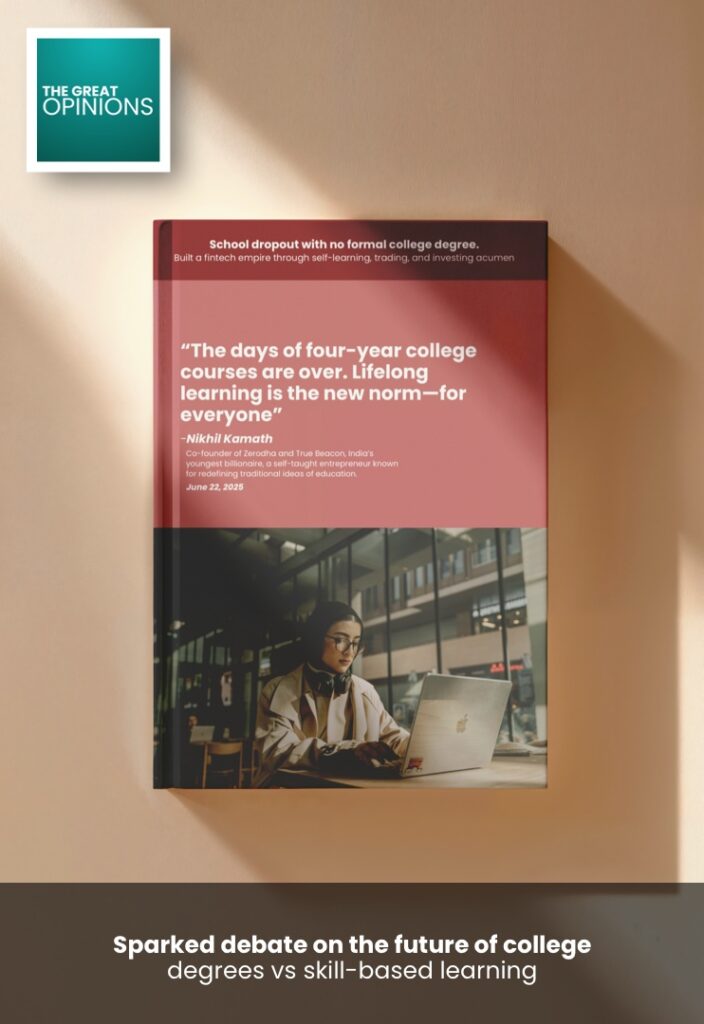
A School Dropout, Not a Knowledge Dropout
Nikhil Kamath’s story is not one of silver spoons or Ivy League polish. He dropped out of school at 16, choosing instead to dive into the world of chess and then, surprisingly, into a call center. It was there, amidst ringing phones and graveyard shifts, that his mind started sketching patterns—not just of markets, but of human behavior, time, and opportunity.
It was also where he began to question the very foundations of structured education.
“What if skill and curiosity mattered more than degrees?” he once asked in a podcast that would go on to trend across platforms.
Building Zerodha: A Silent Revolution
With his older brother Nithin Kamath, Nikhil co-founded Zerodha in 2010. At the time, they had no venture capital, no godfather, and no PR blitz. What they had was clarity.
Clarity that brokerage didn’t have to be expensive.
Clarity that technology could empower the common investor.
Clarity that trust is the most undervalued asset in Indian markets.
And they were right.
Zerodha became the largest retail stockbroker in India, not just by volume but by philosophy. It gave users zero-cost direct investing long before others dared to. And behind the interface was Nikhil, handling proprietary trading and quietly becoming one of India’s youngest billionaires.
The Billionaire Who Dislikes the Word
Despite the wealth and titles, Nikhil’s social media reads more like that of a thinker than a tycoon. His posts? Observations about minimalism, reflections on mortality, commentary on societal gaps in learning.
In one of his recent interviews, he said:
“If we continue to educate people for jobs that won’t exist, we’re not schooling—we’re sedating.”
That line has been picked up by educators, economists, and edtech founders alike. Because it encapsulates a fear no one wants to admit: that traditional degrees may no longer be tickets to stability.
The Podcast That Shook a Generation
In the latest Zerodha-backed podcast, Nikhil sat down with guests from tech, policy, and the arts to discuss the future of skill. He didn’t speak as a host, but as a participant. Someone who listens more than he lectures.
He discussed how adaptability, not achievement, will define success in the 2030s. How portfolios will include wellness and ethics, not just stocks and crypto. And how platforms like True Beacon are experimenting with community-based capital, not just VC-led valuations.
Routines, Reflections, and Radical Honesty
Nikhil begins his day with meditation, reads voraciously, and often shares content that doesn’t trend but transcends. His routines reflect not a billionaire’s braggadocio but a monk-like detachment. Yet, he’s deeply involved in public discourse—from AI ethics to India’s economic strategy.
In a recent fireside at a Bengaluru innovation forum, he urged founders not to chase funding but to chase purpose. That video went viral, but he didn’t repost it.
Lifelong Learning: More Than a Buzzword
Kamath’s latest venture involves micro-skilling hubs across India, collaborating with startups to bring 10-day bootcamps in coding, finance, ethics, and climate. His thesis? Don’t prepare people for jobs. Prepare them for change.
He’s not alone. Industry leaders and policy think tanks are beginning to echo his words. The four-year course, once a rite of passage, is now under scrutiny.
In its place: modular learning, live-case mentorships, and a career that reinvents every decade.
Why This Matters
Because in a country with over 300 million youth, the cost of outdated education is catastrophic. Because degrees without direction are no longer enough. And because people like Nikhil Kamath are not just questioning the old system—they are building the new one.
The line he said that June afternoon is no longer just a quote. It’s a prophecy:
“The days of four-year college courses are over. Lifelong learning is the new norm—for everyone.”
And as that conference room emptied, with notebooks full and minds racing, a quiet truth settled in:
You don’t need to graduate from a college to graduate in life.You just need to keep learning.
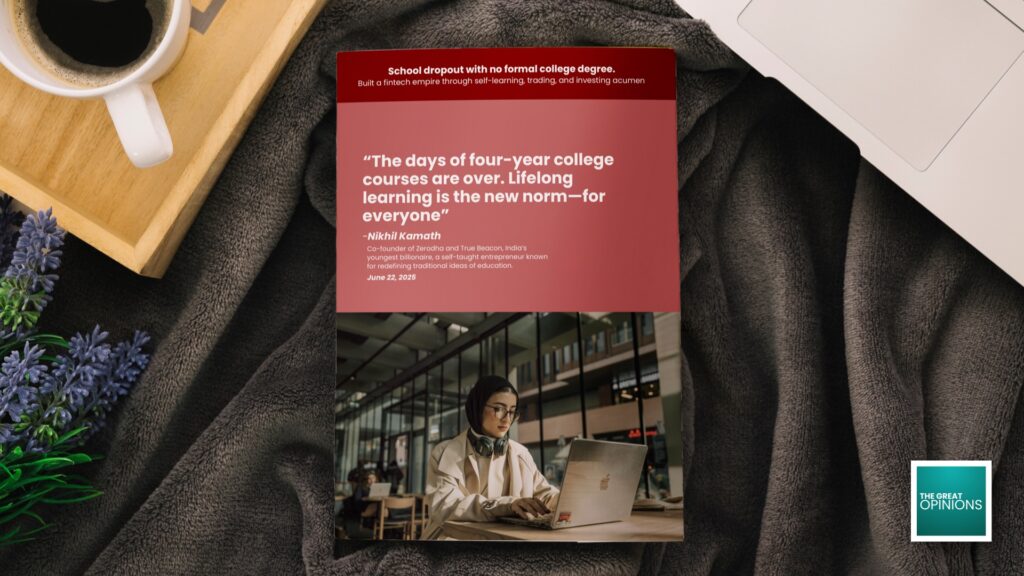
Source:
- Economic Times | Panache – “Forget BTech. Zerodha’s Nikhil Kamath says only one skill will matter to stay relevant in job market in 10 years”
- startuppedia – “‘Days of 4-year college courses are over’: Nikhil Kamath says you won’t be able to survive with a degree”
- TimesofIndia – “Nikhil Kamath reveals the only jobs likely to survive in 10 ..”

